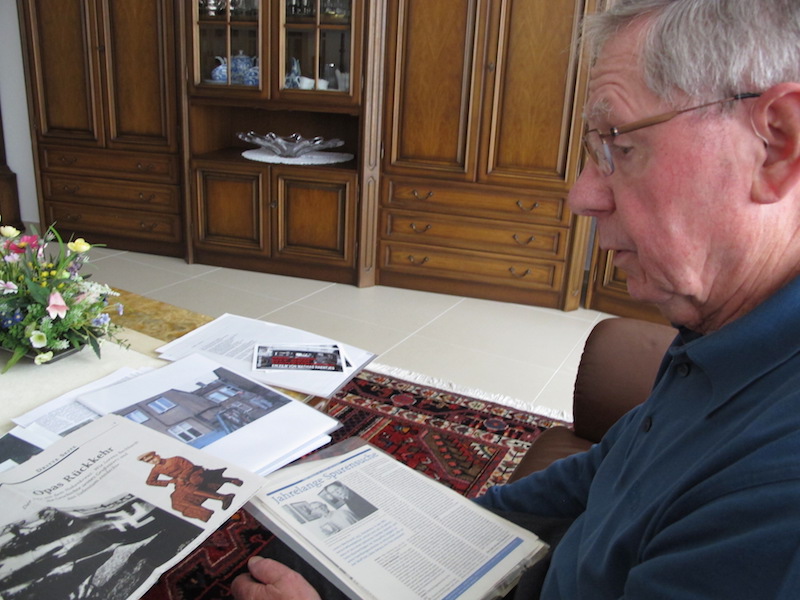American Abroad: Breaking Barriers with Travel And Conversation
Kurt Beckhardt, a spry gentleman with white hair, flipped through photos of his boyhood in Germany. He was forced to flee his small hometown on a bend in the Rhine River west of Frankfurt to escape Hitler's persecution of the Jews.

I gently peppered him with questions, genuinely curious about his life. He insisted after the war that he return to Germany with his father because "this was my town, too." He was determined not to let the Nazis win, even though the same people st
ill ran everything in town.
After the interview, Beckhardt's adult son took me to the side and thanked me for taking such an interest in his dad.
"You are the first positive interaction that my father has had with an American,"
Lorenz Beckhardt said, noting that his father had come to know Americans only as the loud, brash, lumbering loudmouths he'd encountered on cruise ships and never as the quiet, curious woman looking at photos in his Bonn home that day.
Not many of us would admit to fitting the stereotypical image of an American. We are not all loud and obnoxious. We are not all blond cheerleaders or buff football players, ready to hit the field after a tailgate party on a Friday night. We don't all bounce -- or at least bounce well -- as we run down the beach in slow motion, as the buxom blondes do on television.
Since last summer, ISIS in Syria has killed several Americans in a so-called war against America.
ISIS has thrown all Americans under one label, a label that marks us for indescriminate hatred. But we defy that label. We are Christians, atheists, Muslims and Jews. We are white, golden brown, chocolate and olive. We are kimchi-loving, sardine-hating, taco-eating and everything in between, each of us adding a unique spice to the red-white-and-blue "melting pot" known as America. At times, it's hard to figure out what it means to actually "be American."
My ancestors came from Germany, France, Lebanon, England and Scotland. My American identity is shaped by all of those cultures, handed down through the generations. I have a belief in rules and consequence from my German side, a love of pastries from my French side, the passionate ability to argue from my Lebanese side and skin that does not tan, to the point of being pasty, from my English and Scottish side. All of that, every spice from every country, makes me American.
Despite my WASP appearance, I'm not atypical. For someone who doesn't look like me, it's worse.
About a year after the September 11th attacks, I attended an "Open Mosque Day" at a mosque in Garden Grove. I was there to cover the event as a reporter and learn a little bit about the Muslim faith and about what neighbors thought of it.
At one point during the program, visitors got a chance to ask the Imam questions. One woman stood up and in a defensive tone, shot a question at the Imam.
"Well, are you American or are you Muslim?" she asked the Imam, accusingly.
The Imam calmly replied, "I believe we can be both American and Muslim."
The woman quietly sat down.
I know how challenging it can be to represent a cultural identity, especially overseas.
During a trip to Germany in 2006, I was standing on a bridge in Dresden, watching the sinking sun paint the sky with swaths of pink and purple.
A woman in her early 80s came up to me and asked me something in German.
"Ich spreche nur ein bisschen Deutsch," I told her. I only speak a little bit of German.
When she realized I was American, she began to tell me in simple German how she'd grown up in the area. She was there when the Americans and British bombed Dresden in World War II, killing 25,000 people. The woman told me how afterward, everything was "kaput" and the later, how the Communist factories polluted the river, turning it black. After our conversation, she insisted on walking me to my bus stop.
I didn't realize just how unusual our exchange was until I got back to Berlin and told my German friends what had happened.
"She told you all of that?" my friend asked.
"Yes," I replied.
"Usually older Germans who lived through the war, especially in that area, are not that open with Americans, since the Americans destroyed their city," my friend explained.
In a small way, I'd unknowingly become an American ambassador in that interaction with the old woman. Looking back, it feels symbolic that our chance meeting took place on a bridge, connecting two cultures.
No one person can represent American culture. If we put everyone into one pot, under one label -- whether it's American, German or Muslim - we become bland. We lose the very spices that when woven together make us American.
Reach Contributor Susan Valot here.



